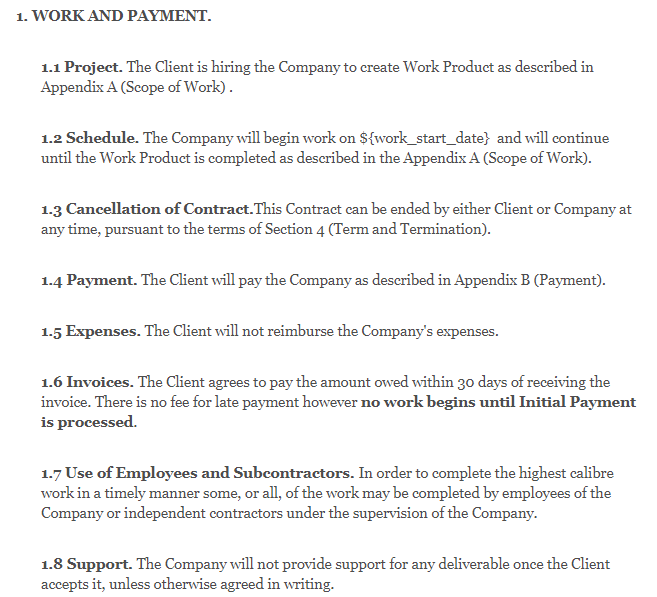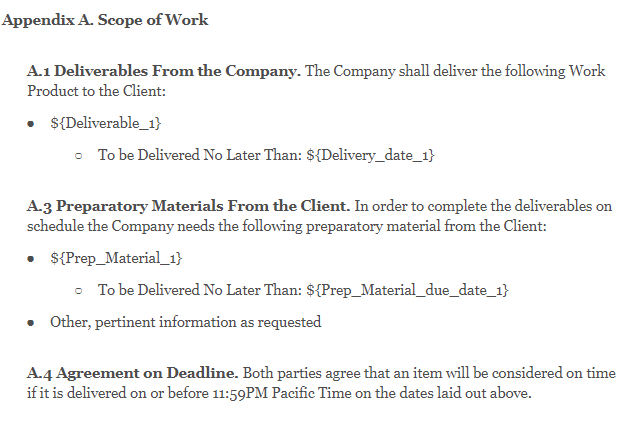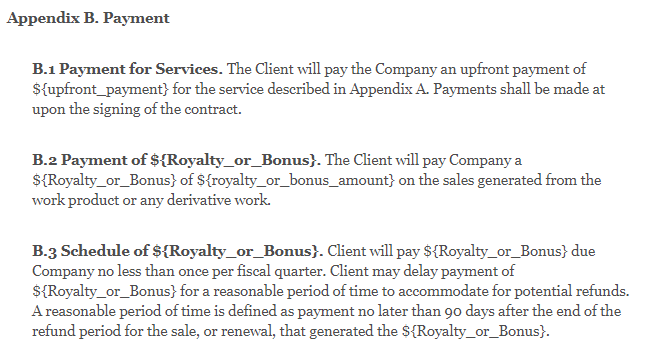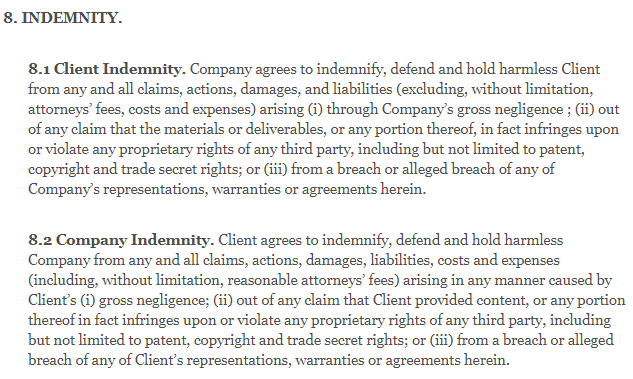How to Write a Freelance Contract: 6 Non-Negotiable Elements


A strong freelance contract keeps your projects on track and your payments on time. You primarily need just six clear elements: a basic introduction, defined work, detailed scope, specific payment terms, a fair termination clause, and legal indemnity to cover your back. When written clearly, these protect both you and your client, save you from scope creep, late invoices, and messy misunderstandings.
The 6 Elements That Make a Bulletproof Freelance Contract
So how do you create a strong freelance contract? By Keeping It Simple, Stupid (K.I.S.S.).
Will Green, a longtime I Will Teach You To Be Rich friend and six-figure copywriter, swears by this principle. You don’t need legal jargon or lengthy documents, just a clear, well-written agreement that protects both you and your client.
These six components have been reviewed by lawyers, tested in real freelance contracts, and proven to hold up in court. Here are the non-negotiables every contract must include:
- Introduction
- Work
- Scope
- Payment
- Termination
- Indemnity
Let’s break down each one and explore why it matters, along with how to write it to ensure your freelance contract protects both you and your client.
Introduction: Setting the stage for your relationship
The introduction of your contract sets the tone for your entire freelance relationship. This is where you lay out the basics in simple, clear terms to avoid any potential confusion later.
In this section, include the full names and contact details of both parties, clearly defining both the Freelancer and the Client. These definitions will be referenced throughout the contract.
This section should also give a high-level overview of the work and set clear expectations from the start. Keep it concise, but precise.
Here’s an example:
"This agreement is between Sarah Johnson (Freelancer) and ABC Marketing Company, John Smith, CEO (Client), for copywriting services beginning March 1, 2024."
Work: Define what work you’ll be delivering
This is where you get into the heart of the contract by clearly outlining your deliverables. It’s essential to be as specific as you can here to prevent confusion and set clear expectations for both sides.
Include three essential components:
- Project overview: Explain exactly what you’ll be doing for the client. Keep it clear and straightforward.
- Timeline: Specify start and end dates for the project, including any key milestones if applicable.
- Payment structure: State how you’ll be paid and when the client is expected to pay you.
If your project has a lot of details, consider moving extensive information into separate appendices to avoid cluttering the main contract.
Here’s an example:

Scope: Clearly defining the boundaries of your work
This section is your frontline defense against scope creep, which happens when clients request extra work or revisions beyond what was originally agreed upon. The best way to prevent this is extreme specificity from the start. Clear boundaries save you time, effort, and stress, sparing you from further renegotiations every time a client asks for additional work.
Dedicate space to outline exactly what you will deliver, including:
- Quantities and formats: E.g., five 500-word blog posts delivered in Google Docs format.
- Client responsibilities: What the client must provide (e.g., topic briefs, images) and the timeline for approvals.
- Out-of-scope statement: Clearly state that any work or revisions requested beyond the defined scope will require a new change order, timeline, and fee.
The clearer and more detailed you are, the better you protect yourself from clients who try to expand the project without expanding the budget.
Here’s an example:
"The freelancer will deliver five 500-word blog posts in Google Docs format by March 15, 2024. The client will provide topic briefs, images, and feedback within two business days of submission."

Payment: Ensuring you are paid for your services
This is one of the most important sections of any freelance contract. You need to be precise about how and when you will be paid. Any ambiguity can create room for delayed payments or underpayment一or even result in your completing a project without receiving your full payment.
You should be specific about:
- Total fee: The exact total amount you will be paid
- Payment schedule: When payments are due (e.g., 50% upfront, 50% upon completion, or monthly)
- Payment method: Your preferred method (e.g., direct deposit, ACH)
- Late payment penalties: A penalty fee for overdue invoices (e.g., 5% compounded monthly)
- Cancellation fees: Ensures compensation for work already completed, even if the client terminates the project unexpectedly
Here’s an example:

Termination: Providing a clear exit for both parties
Sometimes, despite best efforts, a freelance project or working relationship simply doesn’t work out. This section is crucial for establishing rules for ending the contract fairly, giving both you and the client a clear exit path.
Key points should include the following:
- Required notice: Most contracts require written notice (typically via email) with at least a one-week lead time before termination takes effect. This buffer prevents abrupt cancellations.
- Final payment: Outline the process for final payment and when it is due.
- Work ownership: Specify what happens to any work completed up to the termination date. By defining these terms upfront, you protect your income, your time, and the integrity of your work.
Here’s an example:

Indemnity: Protecting yourself legally
“Indemnity” essentially means protection against legal responsibility. This section is your contract’s safety net, designed to shield you from legal and financial risks. Specifically, a good indemnity clause protects you from being held responsible for the client's actions or liabilities, particularly after you deliver the final work.
For example, if your copywriting work is used by the client and they are later sued for trademark infringement, the clause should shield you from that lawsuit. A well-written clause provides clear boundaries, covering issues like gross negligence, intellectual property disputes, or other liabilities that could arise during the project.
While some legal knowledge helps, it’s always wise to consult an attorney to ensure your contract meets current legal standards and adequately protects your interests.
Here’s an example:

Why Smart Freelancers Never Work Without a Contract
It’s tempting to skip the paperwork and dive straight into the work so you can start earning, especially when you’re starting out and every project feels crucial to your survival.
But working without a contract is very risky. A contract provides essential safeguards against scope creep, delayed or incomplete payments, unclear expectations, and situations where clients could misuse your work.
This protection isn’t one-sided. A well-crafted contract also shields your client by setting clear boundaries, professional standards, and mutual expectations from day one. It creates a foundation of trust and clarity, allowing both parties to focus on the work rather than wasting time resolving any potential misunderstandings.
Here are a few more reasons why you need a bulletproof contract as a freelancer:
It becomes your legal shield when clients refuse to pay or disappear
A freelance contract is your concrete proof of the working agreement and can be legally enforced if either party violates its terms.
When clients refuse payment, misuse your work, or breach confidentiality, your contract provides the documentation needed for legal recourse. Courts require written evidence of agreements, and without a contract, disputes often become he-said-she-said situations that rarely favor the freelancer.
With a solid contract in place, you can pursue legal action with confidence, knowing you have the paperwork to protect both your income and your professional reputation.
It’s protection against scope creep that kills your hourly rate
Clients naturally want maximum value for their investment, which often leads to requests for extra work beyond the original agreement.
Without clearly defined project boundaries and deliverables in your contract, they may assume that small additions or quick changes are included in your original quote. A solid contract gives you a professional way to redirect these requests into separate projects or change orders, protecting your time and ensuring you are fairly compensated for all your work instead of giving away your labor for free.
It builds professional credibility that attracts higher-paying clients
Presenting a well-structured contract signals to clients that you are a serious professional, not someone dabbling in freelance work as a side project.
High-quality clients expect freelancers to understand business fundamentals, including proper contracts, and they are willing to pay premium rates for that professionalism. At the same time, clients who resist signing contracts or try to negotiate away key protections are often the ones who create problems with payments, scope creep, and unreasonable demands. In these situations, a contract acts as a filter to attract better clients who align with your professional values.
It provides peace of mind that lets you focus on delivering great work
A comprehensive contract removes the anxiety and uncertainty that come with informal arrangements, allowing both you and your client to concentrate fully on the project. When expectations such as deliverables, timelines, payment schedules, and revision processes are clearly documented upfront, everyone can move forward with clarity and confidence.
This approach reduces stress, improves work quality, fosters smoother client relationships, and supports your long-term success as a freelancer.
Protecting Your Rich Life Through Smart Business Practices
When you invest time and effort into building your freelance career, it makes sense to protect that investment through solid business practices and legal safeguards. Contracts provide essential security and set clear professional boundaries for both you and your clients, ensuring your expertise and time are valued while preventing unnecessary misunderstandings that could harm relationships or income.
If a business relationship goes sideways or a client tries to take advantage of your services, comprehensive documentation shields your legal rights and financial interests. Smart freelancers know that spending a few hours preparing a contract can save weeks of headaches, thousands of dollars in lost revenue, and the stress of unprotected agreements.
By putting these six essential contract elements in place, no matter the size of your project, you protect your time, income, and professional reputation so you can focus on doing your best work and building the Rich Life you deserve.